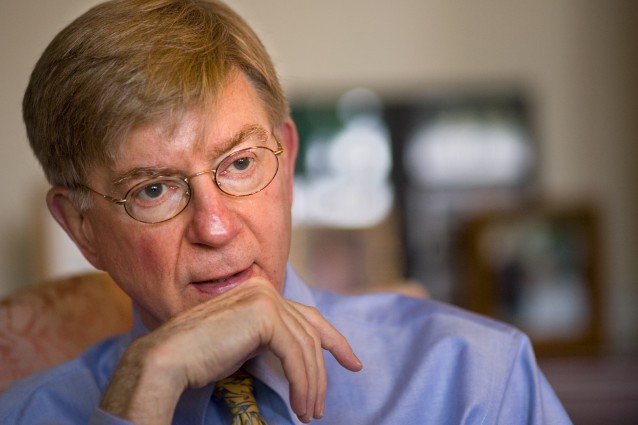
CREDIT: AP Photo/J. Scott Applewhite
June 9, 2014 ThinkProgress.com
In a new syndicated op-ed published in the Washington Post and the New York Post, columnist George Will argues that more college rape victims are now coming forward because victimhood has become “a coveted status that confers privileges.”
According to Will, the campus sexual assault crisis is overblown, based on misleading statistics about the drunken hookups of “especially privileged young adults.” He’s particularly concerned that the federal government’s recent attention to the issue will put more young men at risk of being charged with rape.
“Education Department lawyers disregard pesky arithmetic and elementary due process,” Will writes. “Threatening to withdraw federal funding, the department mandates adoption of a minimal ‘preponderance of the evidence’ standard when adjudicating sexual assault charges between males and the female ‘survivors’ — note the language of prejudgment. Combine this with capacious definitions of sexual assault that can include not only forcible sexual penetration but also nonconsensual touching. Then add the doctrine that the consent of a female who has been drinking might not protect a male from being found guilty of rape.”
Will is the most recent example in a long line of writers who have used their prominent media platforms to suggest that sexual assault victims aren’t completely blameless. College rape is an area that’s particularly ripe for these type of pieces, thanks to the assumption that students are simply drinking too much. Last spring, Wall Street Journal columnist James Taranto argued that rape victims and their rapists should share equal blame if they were both drunk. And Slate contributor Emily Yoffe has written several pieces arguing that it’s college women’s responsibility to avoid rape by drinking less alcohol.
Although sexual assault prevention activists are heartened that the Obama administration is turning its attention to rape on campus, they say we’re still a long way away from a society that “confers privilege” to victims.
“Clearly, George Will has never tried to speak publicly about experiencing sexual assault. People who do that receive death threats and rape threats, and get stalked and followed and harassed,” Harpo Jaeger, a college student at Brown University who’s been active in sexual assault prevention efforts on his campus, told ThinkProgress. “The notion that that’s a privilege is ridiculous.”
Campus rapes are notoriously under-reported for exactly this reason. According to a 2007 report from the Department of Justice, just 12 percent of college sexual assault survivors had ever reported the incidence to authorities. There’s some evidence that reporting rates have risen slightly since then, but there are still plenty of victims who choose not to pursue charges because they’re worried about the potential backlash. The individuals who do speak publicly about their experiences, especially younger women, are routinely bullied and slut shamed. Some are even driven to commit suicide.
“I think in many ways, it’s scary for certain types of individuals to come to terms with the fact that this is the reality on college campuses,” Tracey Vitchers, the communications coordinator at Students Active For Ending Rape (SAFER), told ThinkProgress. “Sometimes, it’s easier to blame the victim and call into question a woman’s story, especially when the assailant may look like you. You don’t want to think of people who look like you in a negative light.”
George Will is hardly the first person to become preoccupied with the men who may be victimized by lenient sexual assault policies. But there’s not much evidence to back up those fears. Although false rape reports are hard to measure, researchers estimate that they make up about two to eight percent of all reports. The women who file false claims often receive punishments that are far worse than the consequences for actual rapists.
Plus, according to Vitchers, it doesn’t make much sense that college students would choose to subject themselves to a lengthy investigation and disciplinary process for no reason. “That experience is often physically and psychologically draining,” she said. “You have your name dragged through the mud… No one would choose to take on that position.”
Jaeger is optimistic that the growing number of conservative op-eds on the issue of campus sexual assault is actually a good thing for activists like him. “It’s the conservative backlash — first they ignore you, then they laugh at you, then they fight you, then you win,” he said. “If we’re making reactionary, privileged conservatives angry, then we’re doing something right.”
Pushback to Will’s column has already emerged on Twitter, where individuals who have experienced sexual assault are tweeting under the hashtag #SurvivorPrivilege.
